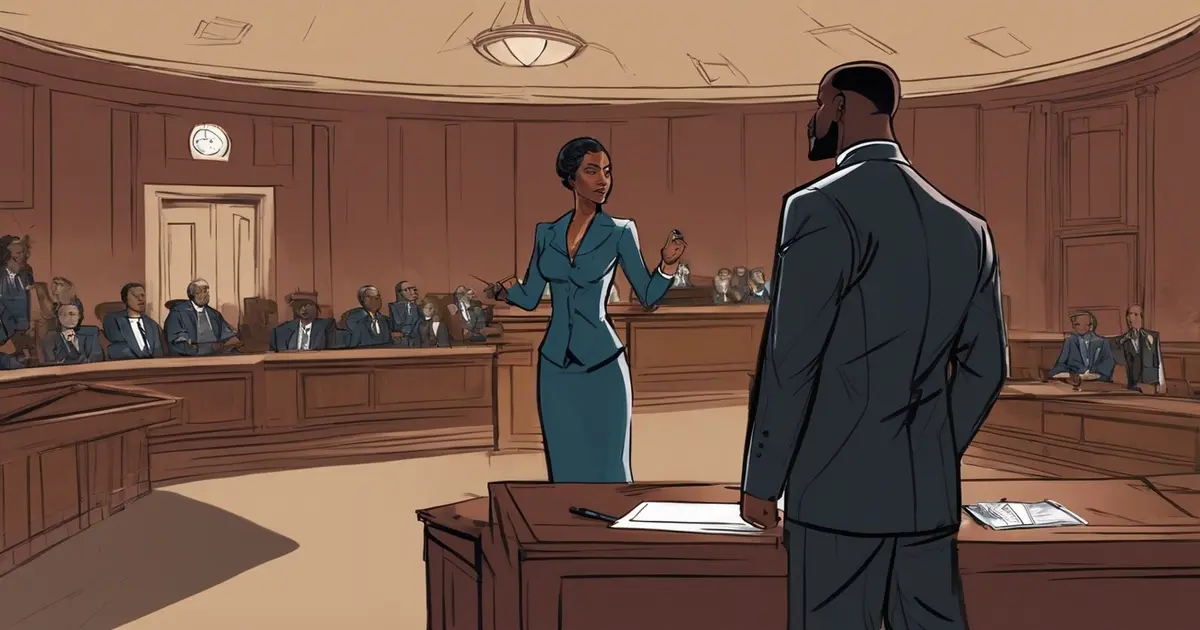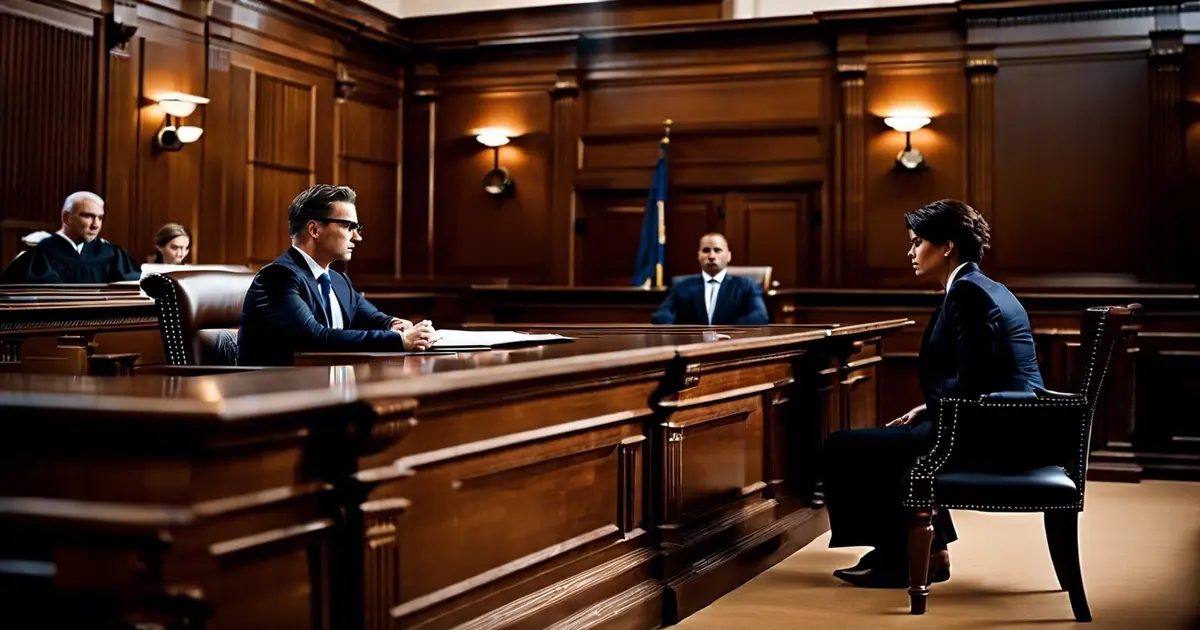Domestic Violence Lawyer: Expert Legal Guide
Nearly 1 in 4 women and 1 in 9 men experience severe intimate partner physical violence, intimate partner contact sexual violence, or intimate partner stalking with impacts such as injury, fearfulness, post-traumatic stress disorder, use of victim services, contraction of sexually transmitted diseases, etc., according to the National Coalition Against Domestic Violence.
In the face of these startling statistics, understanding what a Fort Worth domestic violence lawyer does, including handling claims for either party at a firm, becomes crucial. These legal professionals from the firm are not just lawyers; they're lifelines for those caught in the web of domestic abuse, representing the party in need. They navigate the complex legal system, ensuring victims' voices are heard and their rights fiercely protected. If you're grappling with such issues, knowing how a domestic violence lawyer can help is the first step towards reclaiming your peace and safety.
Table Of Contents
Key Takeaways
- A domestic violence lawyer specializes in navigating the complexities of domestic violence law, ensuring victims' rights are protected and justice is served.
- They play a crucial role in filing lawsuits, navigating divorce proceedings, attaining child custody, and securing spousal support tailored to the needs of the affected party by domestic violence.
- Seeking the assistance of a domestic violence lawyer can significantly impact the outcome of court cases, offering expert representation and a deeper understanding of the legal protections available.
- Victims of domestic violence should prioritize securing legal representation to safeguard their rights and access the full range of support services available.
- The involvement of a skilled lawyer can also facilitate a smoother legal process, reducing stress and uncertainty for victims during challenging times.
- Understanding the importance of legal assistance in cases of domestic violence is essential for victims seeking justice and protection under the law.
Understanding Domestic Violence Law
Legal Definition
Domestic violence encompasses physical, verbal, emotional, and sexual abuse within familial or intimate relationships. This broad definition aims to protect victims by recognizing the various forms of abuse that go beyond physical harm. Laws around the world define domestic violence in this comprehensive manner to ensure all victims have recourse.
Legal systems worldwide acknowledge the severity of domestic violence, often treating it as a distinct category of offense. This distinction is crucial for tailoring responses to the unique context of family violence.
Victim Protection
Laws and regulations specific to domestic abuse aim to safeguard victims and prevent further harm. Many jurisdictions have implemented protective orders or restraining orders as immediate measures to keep abusers away from their victims.
These legal tools offer quick relief and safety for those at risk. They can include provisions such as removing the abuser from a shared home, prohibiting contact with the victim, and ensuring custody arrangements protect children from exposure to abuse.
Jurisdictional Variations
Domestic violence laws vary significantly by state and jurisdiction, reflecting different legal frameworks and societal attitudes towards family violence. Some areas have established specialized domestic violence courts to handle these cases more effectively.
These courts emerged in the 1980s and 1990s, focusing on improving victim safety and enhancing defendant accountability. Specialized judges in these courts make informed decisions based on their expertise in domestic abuse cases. However, concerns persist that these courts may not fully support survivors or address broader societal causes of domestic violence.
Despite variations, a common goal across jurisdictions is to enhance protections for victims while addressing perpetrators' behavior through legal means.
Specialized Courts
Specialized domestic violence courts play a pivotal role in handling family violence cases. They concentrate on improving victim safety and holding offenders accountable. These courts hear the majority of an area's domestic violence cases on a separate calendar, allowing judges who are experts in this field to make consistent decisions.
Critics argue that while these courts are well-intentioned, they might not adequately support survivors or tackle the underlying societal issues contributing to domestic abuse. Nonetheless, the creation of such courts marks significant progress in how the legal system addresses domestic violence.

Roles of a Domestic Violence Lawyer
Victim Advocacy
A domestic violence lawyer is a pillar of support for victims. They ensure the victim's safety and rights are prioritized throughout the legal process, which involves obtaining protective orders to safeguard victims from further harm.
Their role extends beyond the courtroom. They provide comprehensive legal advice tailored to the complex nature of domestic violence cases. This guidance is crucial in helping victims understand their legal options and the potential outcomes of their cases.
Legal Support
Navigating the legalities of domestic violence cases can be daunting for victims. A domestic violence lawyer simplifies this process. They prepare and present evidence effectively, aiming to secure justice for the victim.
These lawyers also handle all legal documentation and filings, ensuring accuracy and timeliness. Their expertise in domestic violence law enables them to anticipate challenges and strategize accordingly, increasing the likelihood of a favorable outcome.
Liaison Role
Domestic violence lawyers act as connectors between victims and essential support systems. They facilitate access to shelters, counseling services, and other resources aiding the victim's recovery.
They communicate with various stakeholders involved in the case, including law enforcement and social services. This ensures a coordinated approach to providing comprehensive support to the victim.
Filing Lawsuits for Victims
Legal Guidance
Domestic violence lawyers offer crucial support to victims looking to file civil lawsuits. They navigate the complex legal system, ensuring the victim's voice is heard. These legal experts guide clients through each step, from initial consultation to lawsuit filing.
Victims receive advice on the most effective strategies for their cases. Lawyers assess the situation, considering all aspects of the abuse and its impact on the victim's life. This holistic approach ensures that all relevant claims are included in the lawsuit.
Evidence Documentation
Gathering evidence is a pivotal part of building a solid case against an abuser. Domestic violence lawyers assist victims in documenting all forms of abuse. This includes physical injuries, psychological trauma, and financial control.
They help secure medical records, witness statements, and other evidence substantiating the victim's claims. Photographs, videos, and digital communication records often play a significant role in these cases. Lawyers ensure this evidence is collected legally and ethically.
Understanding Outcomes
Domestic violence lawyers provide clear explanations about potential lawsuit outcomes. They discuss both the challenges and benefits of pursuing legal action against an abuser. Victims gain insight into how a successful lawsuit can offer compensation for damages suffered due to abuse.
Compensation might cover medical expenses, lost income, pain and suffering, and punitive damages designed to punish the abuser. Lawyers also prepare clients for possible defenses the opposition raises, including false claims of mutual abuse or self-defense.
Navigating Divorce Proceedings
Legal Representation
Domestic violence lawyers offer crucial support during divorce proceedings. They understand the complex dynamics of family relations impacted by abuse. These professionals navigate the legal system to protect their client's rights and interests.
A domestic violence lawyer will guide victims through each step of the process. They ensure that all necessary documents are filed correctly in family courts. This attention to detail is vital for a smooth legal journey.
Strategy Advice
Lawyers specializing in domestic violence cases provide strategic advice on handling divorce negotiations. Their expertise helps victims make informed decisions that safeguard their future.
They advise on how to present evidence, such as text messages or emails, proving domestic abuse. Understanding the nature of evidence and its impact on the case is critical. It can significantly influence the outcomes.
Safety Measures
Obtaining restraining orders is often an essential aspect of divorce proceedings involving domestic violence. Lawyers play a pivotal role in securing these orders promptly.
They work diligently to ensure their client's safety throughout the legal process. This includes advising on safe communication methods with the opposing party or family member.
Attaining Child Custody Support
Custody Battles
Domestic violence lawyers play a crucial role in custody disputes. They prioritize the child's safety and best interests above all. These legal professionals understand that children from households affected by violence require special consideration during custody evaluations.
Lawyers present compelling evidence of domestic violence to ensure that the court fully grasps the situation's severity. This evidence can significantly influence the court's decision on custody arrangements. It highlights the need to protect children from further exposure to harmful environments.
Safety Measures
In cases where one parent has a history of abuse, domestic violence lawyers work tirelessly to secure supervised visitation or no-contact orders. This action is vital for safeguarding the children and the victimized household members.
They argue for arrangements that minimize risks while allowing children to maintain necessary relationships safely. Supervised visitation ensures that interactions between the abusive parent and child occur in a controlled, safe environment. No contact orders, on the other hand, completely restrict any form of communication with the abusive party when it serves the child's best interest.
Evidence Presentation
Gathering and presenting evidence is a meticulous process undertaken by domestic violence lawyers. They compile police reports, medical records, witness statements, and any relevant documentation that demonstrates a pattern of abuse within the household. This evidence is critical in making a solid case for their client.
Such detailed documentation helps judges understand the dynamics of abuse and its impact on children and household members. It strengthens the argument for why specific protective measures, like supervised visitation or sole custody, are necessary.
Securing Spousal Support
Fair Negotiations
Domestic violence lawyers in Fort Worth are skilled at negotiating fair spousal support arrangements. They understand that victims of domestic abuse often face financial hardships after leaving their abusers. These attorneys work diligently to ensure the spousal support reflects the victim's needs and circumstances.
They consider various factors, such as the duration of the marriage, the standard of living during the marriage, and each spouse's financial resources. Their expertise allows them to present a strong case for why their client deserves support.
Impact on Entitlements
The impact of domestic violence on spousal support entitlements is significant. Courts often view victims of domestic abuse more favorably when determining spousal support. This is because the law recognizes the economic disadvantages these victims face, mainly if the abuse has limited their ability to gain employment or has resulted in medical expenses.
Domestic violence lawyers highlight how the abuse has affected their client's financial stability and earning capacity. They ensure that the court understands the full extent of the impact, which can lead to more favorable spousal support arrangements for the victim.
Enforcement
Unfortunately, obtaining a spousal support order does not guarantee compliance by the abuser. Domestic violence attorneys play a crucial role in enforcing these orders. If an abuser fails to comply with spousal support obligations, these lawyers can take legal action to enforce payment.
They may request wage garnishment, where a portion of the abuser's wages is directly sent to the victim. They can also ask for contempt charges against the abuser for failing to follow court orders. Through persistent legal efforts, they help ensure that victims receive the financial support they are entitled to.
Court Representation Explained
Victim Preparation
A domestic violence lawyer plays a crucial role in preparing the victim for court appearances. They ensure the victim understands the legal process and what to expect during hearings. This preparation includes coaching on answering questions clearly and calmly, which can be pivotal in the case outcome.
They also help victims manage their emotions. Courtrooms can be intimidating, and facing an abuser can trigger strong emotional responses. Lawyers provide support and strategies to maintain composure, making it easier for victims to testify effectively.
Evidence Strategy
Presenting evidence of domestic violence requires careful planning and strategy. Domestic violence lawyers are skilled at gathering and organizing evidence that supports the victim's claims. This might include photographs of injuries, text messages or emails that show abusive behavior, or medical records.
Strategizing on presenting this evidence is critical to building a solid case. Lawyers ensure that all relevant information is admissible in court and presented in a way that accurately conveys the seriousness of the abuse. They know how to counteract common defense tactics that aim to discredit the victim or minimize the abuse.
Advocacy in Court
Advocating for the victim's rights and interests is a primary function of a domestic violence lawyer during trials and hearings. They argue on behalf of the victim, seeking justice and protection from further harm. This advocacy extends beyond just aiming for a conviction; it includes fighting for restraining orders, custody arrangements, and appropriate financial support.
Domestic violence lawyers are vocal champions for their clients in courtrooms. They navigate complex legal systems to ensure victims' voices are heard and respected throughout judicial proceedings. Their expertise helps secure favorable outcomes and empowers victims during one of their most vulnerable times.

Protecting Victims' Rights
Legal Advocacy
Domestic violence lawyers play a crucial role in advocating for victims' rights. They work tirelessly to ensure that those suffering from abuse understand their legal protections. This includes explaining how the law can shield them from further harm and what steps they need to take to secure their safety.
These attorneys help victims navigate the complex process of obtaining protective orders. Such orders are legal documents issued by courts to prevent abusers from contacting or coming near their victims. The process requires presenting convincing evidence of abuse, which can be daunting for victims. Lawyers specializing in domestic violence are skilled at gathering necessary documentation, such as police reports and medical records, to build a strong case.
Enforcement Support
Once a protective order is in place, enforcement becomes the next challenge. Domestic violence lawyers collaborate with law enforcement officers to ensure these orders are strictly enforced. They act as a bridge between victims and the police, facilitating communication and ensuring that any violations of restraining orders are promptly addressed.
They also assist in filing police reports and can represent victims during legal proceedings related to enforcing protective orders. If an abuser violates an order, these lawyers will advocate on behalf of the victim to have the violator arrested and brought before the court.
Systemic Change
Beyond individual cases, domestic violence attorneys often push for broader changes in legal proceedings that prioritize victim safety. They may work with lawmakers to draft legislation that provides more excellent protection for victims or seek reforms within the judicial system that make it easier for victims to access justice without placing themselves at further risk.
Their advocacy extends to raising public awareness about domestic violence issues and educating both the community and officials about the importance of protecting those who have been subjected to abuse.
Importance of Legal Assistance
Early Intervention
Securing legal help early can significantly impact the outcome of domestic violence cases. A domestic violence lawyer offers more than just legal advice; they provide a strategic plan to protect the victim's rights and well-being. Early intervention allows for the timely filing of restraining orders and ensures that victims have a safe space away from their abusers.
Victims often feel overwhelmed by their circumstances. A lawyer helps navigate the complex legal system, making it less daunting for them. This crucial step safeguards immediate safety and lays the groundwork for long-term protection.
Pathway to Justice
Domestic violence lawyers play a pivotal role in delivering justice for victims. They represent victims in court, fighting for their rights with dedication and expertise. These professionals understand the nuances of domestic violence cases, ensuring that all relevant evidence is presented effectively.
They work tirelessly to hold abusers accountable under the law. Their efforts can result in restraining orders, custody arrangements, and financial support that favor the victim. Lawyers are instrumental in turning the tide towards justice, giving victims a voice in situations where they might otherwise feel powerless.
Healing Process
Legal assistance is a vital component of the healing journey for survivors of domestic violence. Victims take an essential step towards reclaiming their lives by taking legal action. It represents a break from past abuse and a move towards independence and self-empowerment.
Lawyers not only offer legal support but can also connect victims with resources for emotional and psychological recovery. This holistic approach aids in healing from trauma, allowing survivors to start anew on solid ground.
Final Remarks
Navigating the complexities of domestic violence law demands expertise. A domestic violence lawyer plays a crucial role, from understanding the intricacies of the law to protecting your rights and securing the support you need. Whether filing lawsuits, navigating divorce, attaining child custody, or securing spousal support, these legal professionals are your frontline defense. They ensure your voice is heard and your rights are upheld in court.
The importance of legal assistance cannot be overstated. It's about more than just legal battles; it's about reclaiming your life and moving forward confidently. Don't go at it alone. Reach out to a qualified domestic violence lawyer today and take the first step towards a safer, more secure future for you and your loved ones. Your well-being matters. Act now.
Frequently Asked Questions
Related Post
Divorce Lawyer
Ever wonder what stands between a messy breakup and a smooth transition to the next chapter of your life? Collaborative divorce, an experienced divorce attorney, uncontested divorce, and handling divorce cases can make all the difference.
Read MoreAdoption Lawyer Guide
Why navigate the complex world of adoption, parental rights, and advertising for birth mothers alone when an adoption lawyer can guide you through every step of the way?
Read MoreChild Custody Lawyer Guide
Navigating the maze of child custody cases can be daunting, especially when emotions run high, problems with a spouse escalate, and stakes are even higher in front of a judge.
Read MoreFamily Lawyers
Did you know that nearly 50% of marriages in the U.S. end in divorce or separation, often involving family law matters such as spousal support?
Read MoreSports Lawyer
Have you ever wondered what stands between a promising athlete's career and the legal hurdles that could derail it? A sports attorney, often supported by sports law attorneys and other sports law practitioners, including a sports agent, plays a crucial role.
Read MoreSports Organization Governance Lawyer
Navigating the complex world of sports organization governance requires a specialized skill set that blends legal expertise with a deep understanding of the sports industry's unique dynamics, including administrative law and critical issues.
Read More






